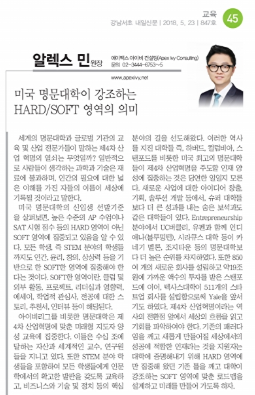미국 명문대학이 강조하는 HARD/SOFT 영역의 의미
Apex Ivy 대표 Alex Min
세계의 명문 대학과 글로벌 기관의 교육 및 산업 전문가들이 말하는 제4차 산업 혁명의 열쇠는 무엇일까? 일반적으로 사람들이 생각하는 과학과 기술은 재료에 불과하며, 인간의 필요에 대한 넓은 이해를 가진 자들의 이름이 세상에 기록될 것이라고 말한다.
변화하고 있는 미국명문대학의 신입생 선발기준을 살펴보면, 높은 수준의 AP 수업이나 SAT 시험 점수 등의 HARD영역이 아닌 SOFT영역에 집중되고 있음을 알 수 있다. 모든 학생, 즉 STEM 분야의 학생들까지도 인간, 윤리, 창의, 상상력 등을 기반으로 한 SOFT한 영역에 집중해야 한다는 것이다. SOFT한 영역이란, 클럽 및 외부 활동, 프로젝트, 리더십과 영향력, 에세이, 학업적 관심사, 전공에 대한 스토리, 추천서, 인터뷰 등이 해당된다.
아이비리그를 비롯한 명문대학은 제4차 산업 혁명에 맞춘 미래형 지도자 양성 교육에 집중한다. 이들은 수십 조에 달하는 자산과 세계적인 교수, 연구원들을 지니고 있다. 또한 STEM 분야 학생들을 포함하여 모든 학생들에게 인문학에서의 확고한 발판을 갖도록 교육하고, 비즈니스와 기술 및 정치 등의 핵심 분야의 길을 선도해왔다. 이러한 역사를 지진 대학들 즉, 하버드, 컬럼비아, 스탠포드를 비롯한 미국 최고의 명문대학들이 제4차 산업혁명을 주도할 인재양성에 집중하는 것은 당연한 일일지 모른다.
이와 함께, 새로운 사업에 대한 아이디어 창출, 기획, 솔루션 개발 등에서, 슈퍼대학들보다 더 큰 성과를 내는 숨은 보석과도 같은 대학들이 있다. Entrepreneurship 분야에서 UC버클리, 유펜과 함께 인디애나(블루밍턴), 시라큐스 대학 등이 카네기 멜론, 조지타운 등의 명문대학보다 더 높은 순위를 차지하였다. 또한 850여개의 새로운 회사를 설립하고 약19조원에 가까운 액수의 투자를 받은 스탠포드에 이어, 텍사스대학이 511개의 스타트업 회사를 설립함으로써 Yale을 앞서기도 하였다.
1차, 2차, 3차 혁명에 이어 제4차 산업 혁명 또한 경제, 사회, 산업, 직업 등 수많은 분야에서 극적인 변화를 만들어 낼 것이다. 역사의 전환점 앞에서 세상의 흐름을 읽고 기회를 파악하여야 한다. 기존의 패러다임을 깨고 새롭게 만들어질 세상에서의 성공에 적합한 인재라는 것을 지원자는 대학에 증명해내야 한다. HARD영역에만 집중해 왔던 기존 틀을 깨고 대학이 강조하는 SOFT영역에 맞춘 로드맵을 설계하고 미래를 만들어 가도록 하자.
[ Apex Ivy 미국 대학 입시설명회 ]
시간: 5월 29일(화) 오전 10시
장소: 섬유센터 17층 스카이홀
알렉스 민(Alex Min) 원장
에이팩스 아이비 컨설팅(Apex Ivy Consulting)
문의 02-3444-6753~5
www.apexivy.net
<영문 버전>
Unlike the common assumption, even among education and industry experts, in Korea and Asia in general, the keys to the economic ownership of the 4th Industrial Revolution are not in technology and the sciences, according to global organizations and universities. In fact, science and technology will be the materials for making the keys, but the title of ownership will be in the name of those who have a broader understanding of humanity and its needs.
Our students, even those aiming for STEM fields, must therefore concentrate on being educated in soft skills, such as Humanity, Ethics, Creativity and Imagination. These ideas seem abstract, but many top US colleges have already restructured their curriculum and education philosophies to such an end. Therefore, getting admitted into America’s top colleges require that students have a displayed record of not only hard knowledge and test scores but also soft skills. These soft skills are measured on many fronts during the application process, from reviews of extracurricular activities versus the impact the applicant has had in the organizations and school clubs he was involved in throughout high school, to his personal story displayed through application essays, to whether his teachers’ recommendations and interviewer reports support the existence of his claimed soft qualities.
Obvious American colleges that are greatly equipped to handle the challenges of educating the future leaders of the 4th Industrial Revolution are the Ivy League and Peers.
Owning endowments in the $billions, home to the world’s leading professors and researchers, having unwaveringly championed strong foundations in the humanities for all students including those pursuing STEM, and with coveted histories for creating an endless trail of leaders of business, technology and politics, colleges like Harvard, Columbia and Stanford being able to educate students for the 4th Industrial Revolution is an obvious assessment.
However, there are many other hidden gems in the US with stronger achievements in 4th Industrial Revolution relevant areas than the super schools. The 4th Industrial Revolution requires the ability to create new business ideas, models and solutions. Well known college like Berkeley and U Penn hold top 10 positions, but few Korean students and parents know that Indiana University at Bloomington and Syracuse University rank higher in Entrepreneurship than Carnegie Mellon and Georgetown for the major. Looking specifically into student entrepreneurship support systems, which include advising from professors and Fortune 500 networking to even investment track record from major US banks, Stevens Institute of Technology ranks higher than Brown and Dartmouth. At Stanford, students have started 850 companies and have received a total of $18.2 billion in investments, while Yale with 379 student startup companies trails behind University of Texas at Austin with 511.
Every industrial revolution from the 1st to the 2nd to the 3rd produced new winners and losers, and the 4th Industrial Revolution will also cause the economic, industry and career models to change dramatically. Sitting at this tipping point, students must align their priorities toward future building by first identifying the opportunities they would most need from their college education, and engage in building their personal roadmap that can prove to their dream colleges that they have the right type and amount of creativity and experiences for success in a world that will be rewritten by unprecedented possibilities.
Alex Min
